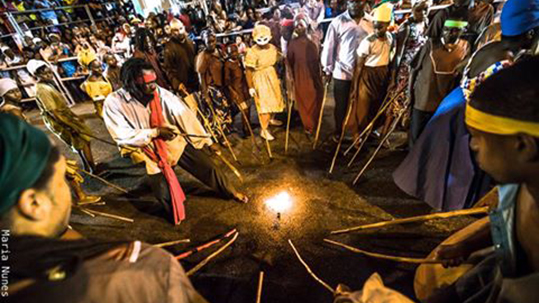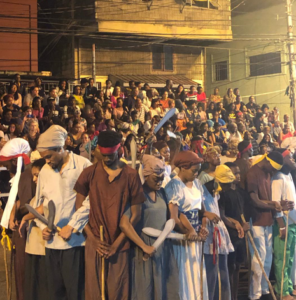
17 Apr Kambule – Carnival in Trinidad and Tobago is saved
It is 2am on Carnival Friday in Port of Spain.
The early morning air is chilly and there is a stillness about the city as only a few cars are on the road at this time. Already, the bleachers on Piccadilly Greens are filling up as people claim the few precious seats. Gradually, thousands of people crowd the space historically known as Behind the Bridge. Located to the east of the city, the area comprises mainly humble homes and businesses.
Vehicles drive into the space and begin to offload numerous suitcases, boxes, costumes and props. The sound engineers check their audio, performers get changed in the tents placed on the street and officials do their final checks. Visitors, nationals and media from all over the world gather. Patiently, they await the 4am start of the play, Kambule.
In 2004, poet and author Eintou Pearl Springer wrote a play about a significant battle between stick-fighters in Port of Spain and the British constabulary in 1881. By the end of the confrontation, the community had defeated the British militia and the Governor was forced to declare that Carnival could continue. The Trinidad and Tobago Carnival was saved.
 The ritual re-enactment of this significant event is the only one of its kind in the world. Started by John Cupid, Norvan Fullerton and Tony Hall in 2000, the first re-enactment took place in front of All Stars Panyard on Duke Street, at the very spot where the 1881 uprising took place. It was called a Re-enactment of the Canboulay Riots, referring to the pre-Emancipation ritual of putting out fires on the plantation by the enslaved. This was called Cannes Brûlées or Canboulay.
The ritual re-enactment of this significant event is the only one of its kind in the world. Started by John Cupid, Norvan Fullerton and Tony Hall in 2000, the first re-enactment took place in front of All Stars Panyard on Duke Street, at the very spot where the 1881 uprising took place. It was called a Re-enactment of the Canboulay Riots, referring to the pre-Emancipation ritual of putting out fires on the plantation by the enslaved. This was called Cannes Brûlées or Canboulay.
In 2010, Eintou changed the name of her play to Kambule, the Kikongo word for procession. Not only does the play document this historic battle, it gives voice to the men and women who were forced to survive while living in relative squalor in the cramped, unsanitary conditions of the barrack yards. The play also recognises that much of the creativity around Carnival took place in those barrack yards and it celebrates the contribution of African people to the development of national culture and the growth of the city.
In 2021, restrictions due to COVID-19 mean that the performance of Kambule in its traditional form would not be possible. However, the good news is more people around the world will have an opportunity to enjoy a mixture of virtual and live activities on Carnival Friday, Monday and Tuesday.
Be sure not to miss a moment of the new Kambule.
We love sharing Kambule and other local festivals with you so like and leave your comments below.
See you at Kambule!


Roberta
Posted at 20:16h, 28 NovemberKnowledge is truly power. Without having an understanding of your heritage, without fully comprehending the impact of slavery on African people and the dismantling of their entire way of life, we are left with what Europeans wanted us to believe.. If I had to make one suggestion it would be to increase the content on the topic. as a means of giving people more information to do their own research on African Spirituality.
Melting Pot
Posted at 11:11h, 08 FebruaryThank you very much for your comment. We do believe that there is a significant gap in our African ancestral history. We certainly are inspired to continue providing information to build a bridge on topics such as African Spirituality and many others. Looking forward to you stopping by on us again.
Hugh
Misael H
Posted at 18:47h, 01 AprilHey seriously find it so interesting to learn about other cultures. This has been a big eye-opener for me in terms of this culture and their heritage. I am Mexican and I love to learn about other cultures including my own because I was raised in the US and I was not accustomed to Mexican cultures so seeing stuff like this is amazing
Geoff
Posted at 18:53h, 01 AprilAh this sounds like a really exciting event. I am sure that the atmosphere is totally electric.
I love events like this the re-enact history to keep it alive and bring it to new generations. Thanks for explaining what the event actually was.
It certainly is a very early start though! I think that there will be a lot of happy but exhausted people in Trinidad and Tobago come Tuesday evening.
Have an absolutely wonderful time and hopefully we will all get to experience it some year soon.
Alinam 2020
Posted at 19:48h, 01 AprilPeople get into shape early in the year to be able to keep up with the pace of Carnival. So we are well accustomed to a 4am start of Kambule. While the two actual Carnival days are the Monday and Tuesday before Ash Wednesday (Feb/ March) the Carnival season itself starts as early as August the year before. There are a wide variety of events for the period that showcase Carnival artistry, costuming, revelry, soca (music), fetes (parties) and much more. We welcome you to come down and enjoy
Jeff
Posted at 19:11h, 01 AprilYou outdid your last article I read about the Carnival with this one, I am a big history fan. Your website provides me very interesting facts about history I might never have known, you can count on me to share this with my family and friends.
I promise to return to your website for another history lesson, and again I am so impressed with how well you explained the Carnival to your readers
Take care
Jeff
Melting Pot
Posted at 20:54h, 01 AprilElated that you enjoyed it so much Jeff and happy that you would share our culture with your family and friends.
JosephC00
Posted at 20:33h, 01 AprilThank you for your detailed overview of the Trinidad and Tobago carnival. I had no idea it had its roots as far back as 1881. It is amazing the ritual re-enactment is the only one of its kind in the world. The Eintou Pearl Springer play, Kambule, sounds fascinating and is clearly something not to miss when visiting the island. Trinidad and Tobago, here I come!
Mike
Posted at 21:21h, 01 AprilHello there! This is an informative read. Kambule sounds like an amazing event to attend. Seems like everyone who goes would have a lot of energy and excitement. Definitely going to have to add this gem to my bucket list of places to travel to. If only COVID-19 can be quickly resolved, but I guess it just takes some patience. I guess it makes this trip that much more worth the wait. Thanks for compiling this.
Melting Pot
Posted at 00:28h, 02 AprilIn anticipation of your packing your bags before long, we look forward to providing you with more information on the wonderful festivals that make up Carnival.
Alketa
Posted at 22:50h, 01 AprilHi, I want to compliment you for writing this post, giving such historical facts and sharing the last news about the Kambule carnival. Sadly, this carnival will not be as every year, but the virtual carnival is a great way to join people together and enjoy the Trinidad and Tobago carnival. I have a question, how to join this virtual event?
Thank you for sharing
Alketa
Melting Pot
Posted at 16:58h, 02 AprilHey, Alketa glad you enjoyed our post. Fortunately, Carnival stakeholders refuse Covid19 to stop our festival completely. So many have put on online shows and events and even created films as part of the generation of online content. Keep checking our space for all the exciting information on Carnival 2022.
Ann
Posted at 02:28h, 02 AprilI have been interested in learning about the Canboulay riots. And summing it up they were riots by the descendants of freed slaves on the islands of Trinidad and Tobago in response to efforts by the British police to crack down on aspects of the celebration of Carnival. The British police didn’t succed so the celebration seems to have gained force.
Melting Pot
Posted at 17:01h, 02 AprilWe are glad Ann that you enjoyed the post. The African contribution has played an indelible part in the development of the fabric that makes up Trinidad and Tobago. Stay tuned for much more.
Kokontala
Posted at 03:00h, 02 AprilHi, I’ve gone through your post about Kambule – The Trinidad and Tobago carnival is saved. I find it very educative and informative. I never thought that there is such a ritual re-enactment in the history of the whole world. I think this act is of great importance because now I know that there were Africans who contributed to the development of national culture and growth of the city as you clearly mentioned. Thank you so much for sharing this beautiful piece of writing with us. I will be visiting your site to learn more, and I will also be sharing it with my students.
Melting Pot
Posted at 16:41h, 02 AprilWe are so glad that you found the article useful. We certainly will strive to put up more of this type of content in the future and look forward to seeing you more.